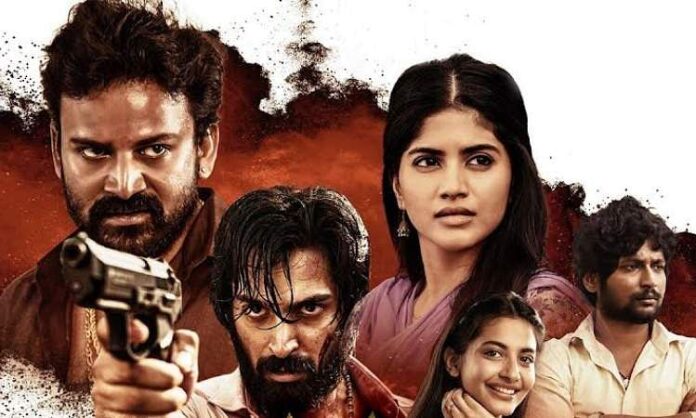It is quite fitting that the protagonist of this film is titled Manu (Shiva Kandukuri), for some stories are as old (and true) as time itself. Almost everyone knows that one boy who dates girl after girl casually, treating them with so much love, only to dump them like garbage later. When you are young, it is devastating. You get older and the same experience turns formative, informing one’s romantic trajectory with doses of caution and self-preservation. Do some forensic work and behind every boy who has grown up to sever intimacy from commitment — there is a crushing love failure™ that the boy has never quite processed. This story, in all its reddit post-level truism, forms the first half of Manu Charitra, as Manu is shown dating multiple girls for a good chunk of the film’s runtime. The MO is the same. Pursue a girl doggedly — and by using extreme, distasteful methods — only to break up with her the moment she reciprocates the interest and proposes back. The premise is plausible, (and frankly a better fit for a true crime story, not a romance) though the mythologisation of this film’s protagonist is as flimsy as they come.
Directed – Bharath Pedagani
Cast – Shiva Kandukuri, Megha Akash, Suhas, Priya Vadlamani, Pragati Shrivastav
Manu Charitra doffs its hat to Sarat Chandra Chattopadhyay’s canonical work Devdas (which is mentioned in the film, for obvious reasons, as ANR’s Devdas) and also to the trope of Hindu-Christian romances, in the form of Manu’s relationship with Jenni (Megha Akash). That is all the film is, rather sadly, content with. Doffing its hat and moving on. Manu Charitra is also full of Arjun Reddy-isms, sans the craft and the unflinching emotional anchoring that made the latter a cult film. There is a hero’s best friend (Suhas), a good ten minutes dedicated to Manu romancing cigarettes, alcohol and drugs, followed by a stint in organised crime. This is not old wine in a new bottle. This is just an empty bottle, rolling on the floor, with residual wine spilling out, as you cry for what all could have happened instead. There is nothing wrong with picking stories that have been told often. Precisely because there is always a new way to tell them. A way to make 2 + 2 add up to 5. But it is safe to say that when the same tropes are presented to audiences without enough recalibration, 2+2 just ends up being -2.
While the story shows some promise, the direction undoes it all. Why is Manu riding a bike wearing sunglasses only to fall down after a fight and get up wearing prescription glasses? Why is a Muslim character walking with her hair open outdoors while she is seen wearing a hijab in her own house? When Jenni breaks Manu’s smartphone accidentally, why does she give him a dabba phone? What good is a burner phone compared to a smartphone? There are one too many shots with its focus off in a rather unflattering way. Shiva Kandukuri’s performance, as an actor and a dancer, leaves a lot to be desired. As Manu shifts jobs, moralities and girlfriends like gears on a manual, we learn a lot about what is going on around the characters in this film, and very little about what is going on within them. There are a few decent lines, particularly the one where Jenni talks about how difficult it is forget one’s true love is one of them. Manu Charitra also makes up for its lack of originality by setting it in the Warangal tri-city area, committing to the town’s sights and stops. Though, and I hope more filmmakers understand this, if you want a city to be a character in your film, adopting a wider aspect ratio than usual is a good move. There is also a hope that filmmakers adopt a fresher perspective to tried and tested stories, which is my biggest takeaway from watching Manu Charitra.

#Manu #Charitra #Movie #Review #tale #familiar #banal

